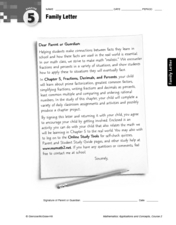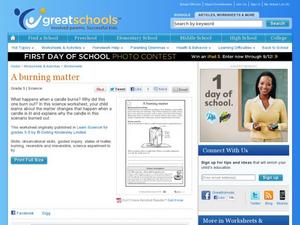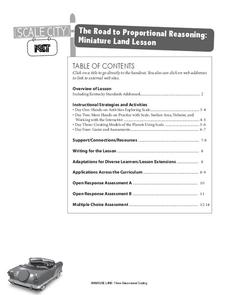Curated OER
Measuring Inches and Centimeters
In this math learning exercise, students learn to measure common classroom objects or body parts using a standard inches ruler and a centimeter ruler. Students measure 21 objects in both ways.
Curated OER
Linear Equations
In this Algebra II worksheet, 11th graders write the equation of a line given a table, the slope and a point, or two points. The three page worksheet contains eleven problems. Answers are not provided.
Curated OER
Collecting Data
In this data collection worksheet, students read about how data is collected and organized. They also learn about a hypothesis. Students read through examples of different charts and then answer 23 questions pertaining to data...
Curated OER
Listing Outcomes
In this probability activity, students learn how to make a tree diagram to determine the possible outcomes in a probability situation. They then answer 4 probability questions.
Curated OER
Geometry Coordinates
In this geometry worksheet, 10th graders calculate ordered pairs using a table to plot the coordinate pairs to make a graph. There are 3 graphing question.
Virginia Department of Education
Relationships Round Robin
Mathematics is all about patterns. Young mathematicians analyze geometric patterns to write algebraic expressions. They use the expressions to predict future stages of the patterns.
Curated OER
Family Activity - Color by Numbers: Fractions, Decimals, and Percents
Learners solve four short answer problems. They determine the number of each color of candy or paper clip in a bag, and calculate the fractional, decimal, and percentage representation of the color compared to the total number of items.
Virginia Department of Education
Factoring for Zeros
Relate factors to zeros and x-intercepts. Scholars first graph quadratics in both standard and factored forms to see that they are the same. They go on to use the graphs to see the relationship between factors and x-intercepts.
Curated OER
Numbers Table Exercise
In this number order worksheet, students study the given numbers and fill in each missing number from 1 to 100. Students enhance their number recognition skills.
EduGAINs
Data Management
Using a carousel activity, class members gain an understanding of the idea of inferences by using pictures then connecting them to mathematics. Groups discuss their individual problems prior to sharing them with the entire class....
Curated OER
How Does Water Cool?
How fast does water cool? First fifth graders will draw a line on a graph that predicts how fast they think water can cool from boiling. Then they plot the actual data on the same graph to see if their estimate was correct.
EngageNY
Analyzing a Graph
Collaborative groups utilize their knowledge of parent functions and transformations to determine the equations associated with graphs. The graph is then related to the scenario it represents.
National Security Agency
Multiple Representations of Limits
After an introductory activity to demonstrate the theory of a limit, additional activities approach a limit from graphical, numerical, and algebraic methods. The activity looks at the multiple ways of understanding and evaluating a...
Curated OER
Exploring Geometry on the Sphere
In this geometry worksheet, students define important vocabulary dealing with circles. They measure cricles to the nearest degree. There are 11 word problems to be solved.
DK Publishing
A Burning Matter
The process of fire requires oxygen, heat, and fuel. Take one of those away, and fire ceases to exist. That's the idea behind this worksheet which portrays a candle burning inside an upside down jar. Pupils answer a couple of questions...
02 x 02 Worksheets
Absolute Value Equations and Inequalities
Demonstrate the meaning of an absolute inequality using three different methods. Here, scholars explore absolute value inequalities through graphing, number line distance, and compound inequalities. Pupils complete various activities to...
Curated OER
Explorations 5: Introduction to Limits
In this limit worksheet, learners find the interval values of given functions. They identify constants, and plot graphs. This three-page worksheet contains approximately 20 problems.
Kentucky Educational Television
The Road to Proportional Reasoning
Just how big would it really be? Young mathematicians determine if different toys are proportional and if their scale is accurate. They solve problems relating scale along with volume and surface area using manipulatives. The...
Achieve
Ivy Smith Grows Up
Babies grow at an incredible rate! Demonstrate how to model growth using a linear function. Learners build the function from two data points, and then use the function to make predictions.
Indian Institute of Technology
Could King Kong Exist?
The title says it all: Could King Kong exist? Investigate how increasing the dimensions of an object affects its surface area and volume to mathematically conclude whether a creature with the weight and height of King Kong could actually...
California Education Partners
Photos
Why do all sizes of pictures not show the same thing? Class members analyze aspect ratios of various sizes of photos. They determine which sizes have equivalent ratios and figure out why some pictures need to be cropped to fit...
Curated OER
The Value of Education
The real value of education is highlighted in more than one way on a instructional activity designed to not only add, subtract, multiply, and divide decimals to hundredths, but also to address the correlation between...
Achieve
Corn and Oats
How much land does a parcel hold? How much fertilizer does it take for a field of corn? Pupils answer these questions and more as they apply ratio reasoning and unit analysis.
Curated OER
Solid Shapes
For this solid shapes worksheet, learners learn to identify and solve word problems that use solid shapes. Students solve six word problems about solid shapes.























